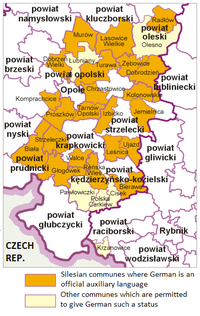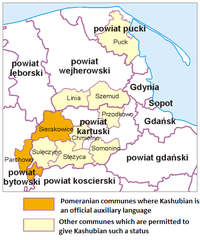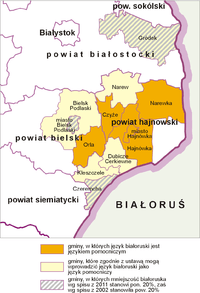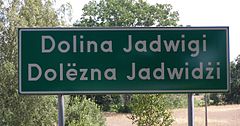Bilingual communes in Poland
The bilingual status of gminas (municipalities) in Poland is regulated by the Act of 6 January 2005 on National and Ethnic Minorities and on the Regional Languages, which permits certain gminas with significant linguistic minorities to introduce a second, auxiliary language to be used in official contexts alongside Polish. So far 44 gminas have done this:[1]
Polish/German

Polish/German bilingual gminas (Gemeinden) in
- Opole Voivodeship (28 municipalities)
- Gmina Biała / Gemeinde Zülz (since 06.03.2006)
- Gmina Bierawa / Gemeinde Birawa (since 23.04.2007)
- Gmina Chrząstowice / Gemeinde Chronstau (since 25.01.2006)
- Gmina Cisek / Gemeinde Czissek
- Gmina Dobrodzień / Gemeinde Guttentag (since 13.05.2009)
- Gmina Dobrzeń Wielki / Gemeinde Groß Döbern (since 22.04.2009)
- Gmina Głogówek / Gemeinde Oberglogau (since 22.04.2009)
- Gmina Gogolin / Gemeinde Gogolin
- Gmina Izbicko / Gemeinde Stubendorf (since 06.03.2006)
- Gmina Jemielnica / Gemeinde Himmelwitz (since 28.08.2006)
- Gmina Kolonowskie / Gemeinde Colonnowska (since 22.09.2006)
- Gmina Komprachcice / Gemeinde Comprachtschütz (since 04.06.2009)
- Gmina Lasowice Wielkie / Gemeinde Gross Lassowitz (since 18.10.2006)
- Gmina Leśnica / Gemeinde Leschnitz (since 17.05.2006)
- Gmina Łubniany / Gemeinde Lugnian
- Gmina Murów / Gemeinde Murow (since 22.04.2009)
- Gmina Pawłowiczki / Gemeinde Gnadenfeld
- Gmina Polska Cerekiew / Gemeinde Groß Neukirch
- Gmina Popielów / Gemeinde Poppelau
- Gmina Prószków / Gemeinde Proskau (since 11.07.2006)
- Gmina Radłów / Gemeinde Radlau (since 25.01.2006)
- Gmina Reńska Wieś / Gemeinde Reinschdorf (since 26.10.2006)
- Gmina Strzeleczki / Gemeinde Klein Strehlitz (since 17.05.2006)
- Gmina Tarnów Opolski / Gemeinde Tarnau (since 15.02.2007)
- Gmina Turawa / Gemeinde Turawa (since 12.09.2008)
- Gmina Ujazd / Gemeinde Ujest (since 28.08.2006)
- Gmina Walce / Gemeinde Walzen (since 04.04.2006)
- Gmina Zębowice / Gemeinde Zembowitz (since 23.10.2007)
- Silesian Voivodeship (3 municipalities)
- Gmina Krzanowice / Gemeinde Kranowitz
- Gmina Rudnik / Gemeinde Rudnik
- Gmina Sośnicowice / Gemeinde Kieferstädtel
Other gminas in Opole Voivodeship and Silesian Voivodeship which would be permitted by the Act to make German an auxiliary language are Olesno and Pawłowiczki.
Polish/Kashubian

Polish/Kashubian bilingual gminas in Pomeranian Voivodeship:
- Gmina Linia (Gmina Lëniô; since 23.04.2012)
- Gmina Luzino (Gmina Lëzëno; since 21.02.2014)
- Gmina Parchowo (Gmina Parchòwò; since 16.08.2006)
- Gmina Sierakowice (Gmina Serakòwice; since 23.10.2007)
- Gmina Żukowo (Gmina Żukòwò; since 17.07.2013)
Polish/Lithuanian
Polish/Lithuanian bilingual gmina in Podlaskie Voivodeship:
- Gmina Puńsk (Punsko valsčius; since 25.05.2006)
Polish/Belarusian

Polish/Belarusian bilingual gmina in Podlaskie Voivodeship:
- Hajnówka-urban gmina (Гайнаўка) on 3 December 2007
- Gmina Czyże (Гміна Чыжы) on 8 February 2010
- Gmina Hajnówka-rural gmina (Гміна Гайнаўка) on 28 May 2010
- Gmina Narewka (Гміна Нараўка) on 16 September 2009
- Gmina Orla (Гміна Орля) on 7 May 2009
Polish/Lemko
Polish/Lemko bilingual names of localities in Małopolskie Voivodeship:
Gallery
 Polish/Lemko place-name sign in Bielanka
Polish/Lemko place-name sign in Bielanka- Polish/Kashubian street name sign in Jastarnia
 Polish/Kashubian road sign with the village name (Dolina Jadwigi)
Polish/Kashubian road sign with the village name (Dolina Jadwigi) Bilingual Polish/Belarusian sign in Oleksze
Bilingual Polish/Belarusian sign in Oleksze Polish/German place-name sign in Kosorowice
Polish/German place-name sign in Kosorowice
References
- "Map on page of Polish Commission on Standardization of Geographical Names" (PDF). Retrieved 20 June 2015.
External links
- Maciej Zych. Minority place names in Poland. United Nations Group of Experts in Geographical Names. Twenty-sixth session. Vienna 2–6 May 2011. Working Paper no. 3.
- List of minority place names in Poland according to Register of the communes where place-names in minority language are used provided by Ministry of Administration and Digitization as of March 8, 2012.